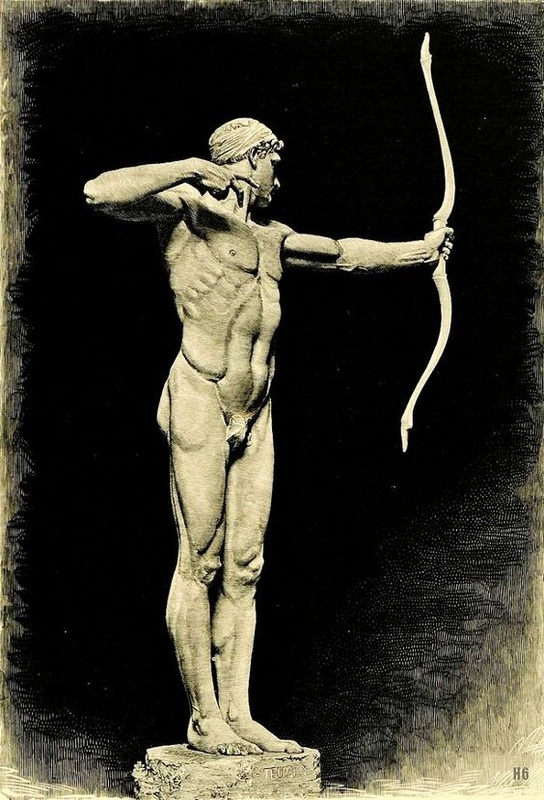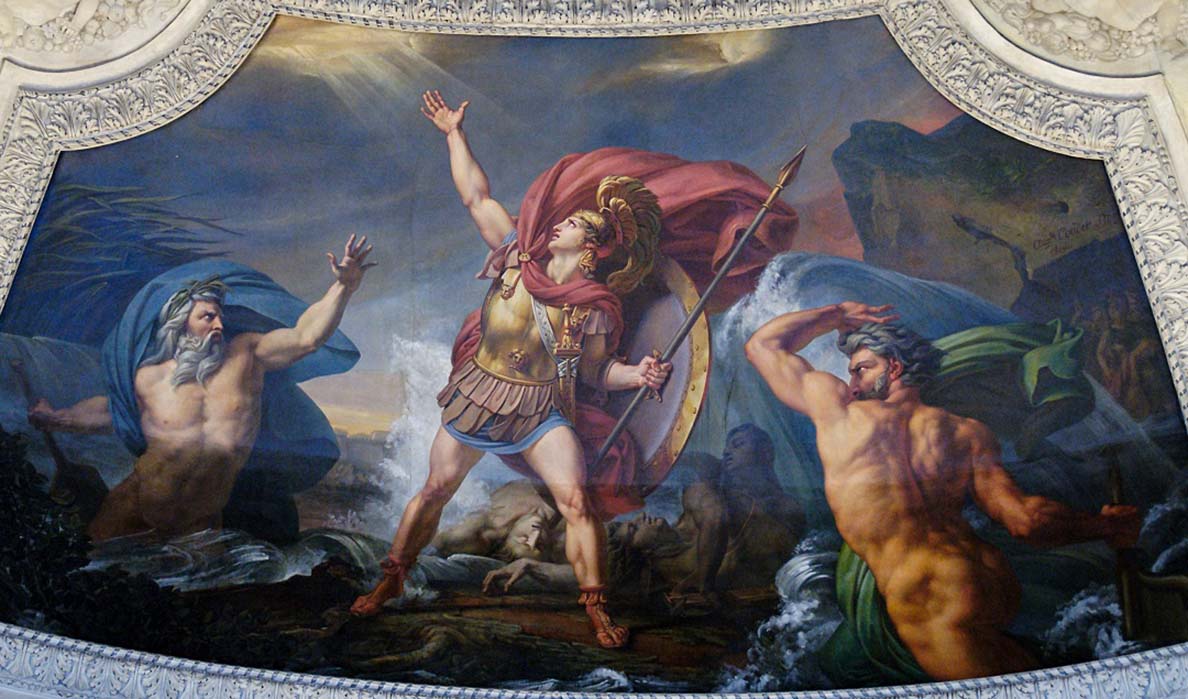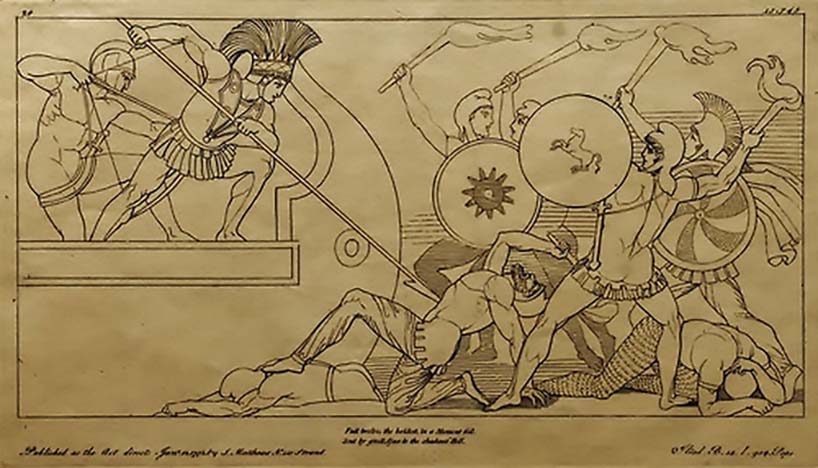Teucer
READ MORE HERE:
Teucer, son of King Telamon of Salamis
Teucer, son of Scamander
Teucer, son of King Telamon of Salamis
In Greek mythology, Teucer, also Teucrus, Teucros or Teucris (Ancient Greek: Τεῦκρος), was the son of King Telamon of Salamis Island and his second wife Hesione, daughter of King Laomedon of Troy.
He fought alongside his half-brother, Ajax, in the Trojan War and is the legendary founder of the city of Salamis on Cyprus. Through his mother, Teucer was the nephew of King Priam of Troy and the cousin of Hector and Paris—all of whom he fought against in the Trojan War.
Mythology
During the Trojan War, Teucer was mainly a great archer, who loosed his shafts from behind the giant shield of his half-brother Ajax the Great. When Hector was driving the Achaeans back toward their ships, Teucer gave the Argives some success by killing many of the charging Trojans, including Hector's charioteer, Archeptolemus son of Iphitos.
However, every time he shot an arrow at Hector, Apollo, the protector of the Trojans, would foil the shot. At one point in his rage at Teucer's success, Hector picked up a huge rock and flung it at him. The rock injured Teucer, so that he retired from the fighting for a certain period of time. He took up a spear to fight in the war after his bow was broken by Zeus.
He once again challenged Hector, and narrowly avoided the path of Hector's flying javelin in the ensuing battle. He was also one of the Danaans to enter the Trojan Horse. In total, Teucer slew thirty Trojans during the war; of those Homer mentions Aretaon, Orsilochus, Ormenus, Ophelestes, Daetor, Chromius, Lycophontes, Amopaon, Melanippus, Prothoon and Periphetes, as well as the aforementioned Archeptolemus. He also wounded Glaucus, son of Hippolochus.
After Ajax's suicide, Teucer guarded the body to make sure it was buried, insulting Menelaus and Agamemnon when they tried to stop the burial. Finally Odysseus persuaded Agamemnon to let the burial happen. Because of his half-brother's suicide, Teucer stood trial before his father, where he was found guilty of negligence for not bringing his dead half-brother's body or his arms back with him.
He was disowned by his father, wasn't allowed back on Salamis Island, and set out to find a new home. His departing words were introduced in the seventh ode of the first book of the Roman poet Horace's Odes, in which he exhorts his companions "nil desperandum", "do not despair", and announces "cras ingens iterabimus aequor", "tomorrow we shall set out upon the vast ocean".
This speech has been given a wider applicability in relation to the theme of voyages of discovery, also found in the Ulysses of Tennyson.
Teucer eventually joined King Belus II in his campaign against Cyprus, and when the island was seized, Belus handed it over to him in reward for his assistance. Teucer founded the city of Salamis on Cyprus, which he named after his home state. He further married Eune, daughter of Cinyras, king of Cyprus, and had by her a daughter Asteria.
Local legends of the city of Pontevedra (Galicia) relate the foundation of this city to Teucer (Teucro), although this seems to be based more on the suspicions that Greek traders might have reached that area in ancient times - hence introducing a number of Greek stories. The city is sometimes poetically called "The City of Teucer" and its inhabitants teucrinos. A number of sporting clubs in the municipality use names related to Teucer.

Teucer, son of Scamander
The name of Teucer, as it appears in Greek mythology, is one closely associated with the Achaean hero Teucer, the half-brother of Ajax the Great. Teucer though is also the given name for a King of the land that would become the Troad; this Teucer would live several generations prior to his more famous namesake.
Teucer is named as a son of the Potamoi, river god, Scamander, and Idaea, the nymph of Mount Ida. Some call Teucer brother of Callirhoe and Glaucia, and whilst it is true Scamander was their father, the births of these, and other individuals connected to the Trojans, occurred over many generations.
Scamander was the god of the river that flows through the Troad; and so, when it is said that Teucer was king of the land known as Teucria in the Troad, it is logical to think that he became king of the land where he was born.
In the Aeneid, by Virgil, it though is stated that Teucer and a large population of people were originally from the island of Crete and had moved to the Troad after a famine had hit the island.
Teucer was said to have been the father of a single daughter, normally referred to as Batea, although sometimes called Arisba.
It is assumed that these are two names for a single daughter rather than two daughters, for it was said that when Dardanus arrived in Teucria he married the daughter of Teucer, who, depending on the ancient source, was called Batea or Arisba.
Teucer would divide his kingdom between his son-in-law Dardanus and himself, with Dardanus’ kingdom becoming known as Dardania. When Teucer died, his kingdom became absorbed into Dardania, for he himself had no sons.
The name of Teucer would be revered amongst the Trojans there after though, and Teucer would be regarded as the first king of the Trojan people, although the populous would not be called that for several generations. The Trojans themselves would often be referred to as Teucrians, and it was a name used a great deal to refer to the people led by Aeneas after the fall of Troy.
There is a circular argument to suggest that Teucer was the founder of the ancient city of Hamaxitus. The Ephesian poet Callinus said of how Hamaxitus was founded by Cretans; the Cretans building on the spot where they were overrun by mice, something they equated to a prior prophecy that they should build where they were attacked by the "earth-born".
These settlers prayed to Apollo for help, and when the god destroyed the plague of mice, they built the temple of Apollo Smintheus in thanks. It is now common to link the Cretan settlers, to Virgil’s telling of Teucer arriving from Crete.

Sources
Homer, Iliad, 8. 265 ff; 12. 329 ff, 364 ff; 15. 442 ff, 478 ff
Il. 8. 320 - 330
Il. 15. 460 - 480
Hyginus, Fabulae 114.
Il. 6. 30; 8. 274 ff; 14. 515
Il. 12. 387
Ajax (Sophocles)
Horace, Odes, 1. 7. 21 ff.
Servius on Aeneid, 1. 619 - 621
Tzetzes on Lycophron, 450; Pausanias, Description of Greece, 1. 3. 2
Virgil, Aeneid 3.104. Translated by Robert Fitzgerald. Harmondsworth: Penguin, 1985, 1983.
Dionysius of Halicarnassus, Antiquitates Romanae 1.61
Strabo, Geographica 13.1.48
Hard, Robin. 1986. The Routledge Handbook of Greek Mythology based on H.J. Rose's "Handbook of Greek mythology". London; New York: Routledge.
Pseudo-Apollodorus, Bibliotheca 3.12.1–3
Lycophron, Alexandra 1308
Diodorus Siculus, Bibliotheca historica 4.75
Virgil, Aeneid 6.743
Virgil, Aeneid 3.148
"Wikipedia"













